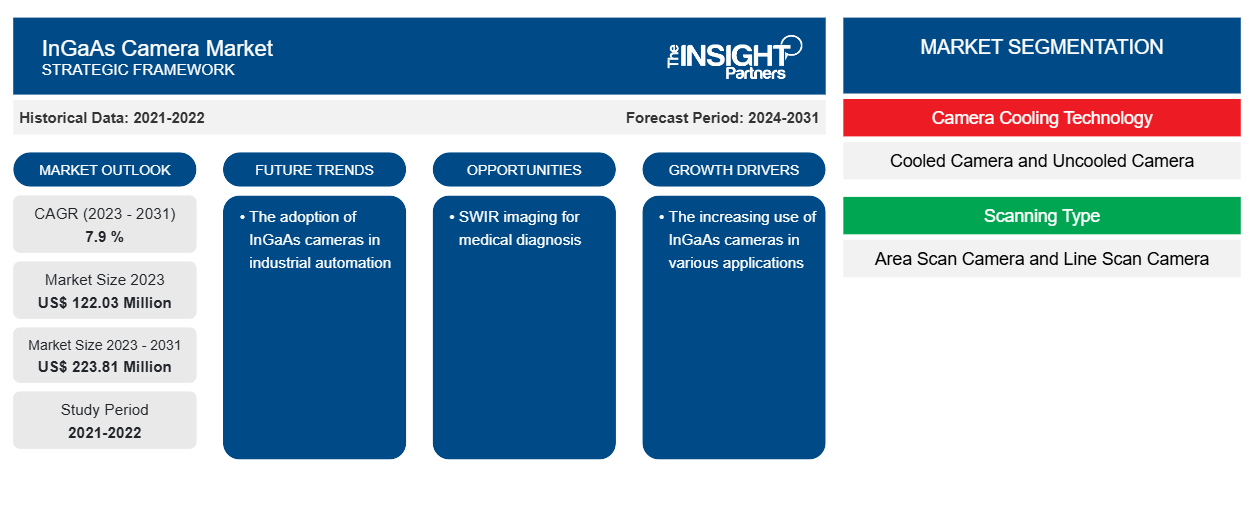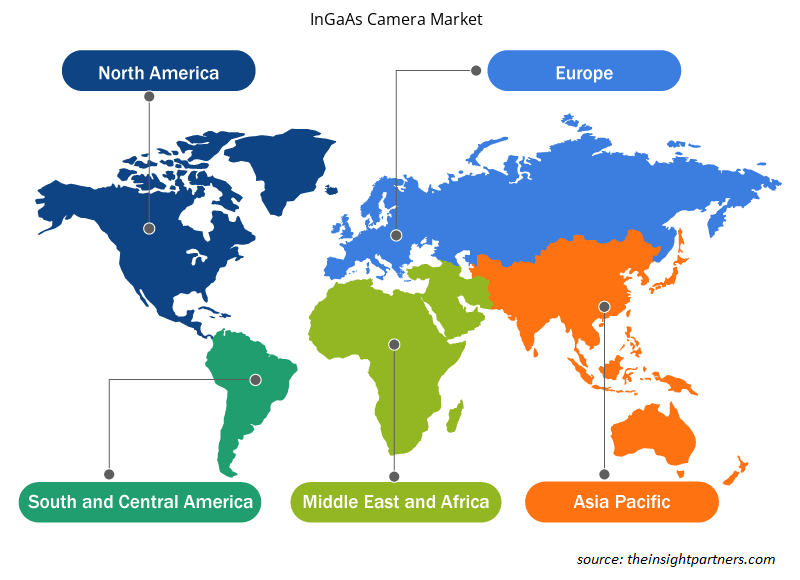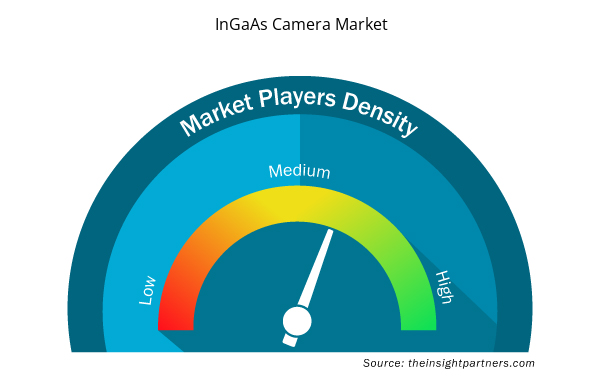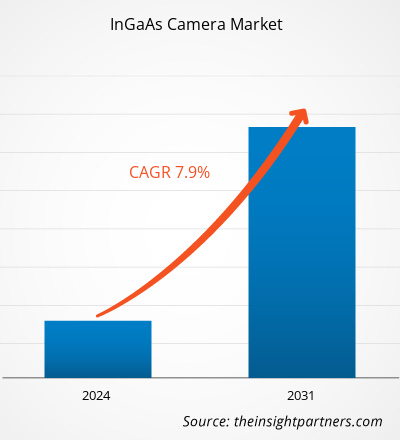The InGaAs camera market size is projected to reach US$ 223.81 million by 2031 from US$ 122.03 million in 2023. The market is expected to register a CAGR of 7.9 % during 2023–2031. The adoption of InGaAs cameras in industrial automation is likely to remain a key trend in the market.
InGaAs Camera Market Analysis
The InGaAs camera market growth is attributed to the increased use of these cameras in various applications, such as industrial automation and medical diagnosis. A SWIR camera can prevent this and thus ensure a smooth production process. Therefore, increasing the use of InGaAs cameras in various applications is driving the InGaAs camera market. SWIR imaging techniques, such as SWIR hyperspectral imaging for biomedical applications and a wideband (VIS+SWIR) digital holographic microscopic system based on a novel quantum-dot (QD) image sensor, are also discussed. Thus, increasing the use of InGaAs cameras in various applications is driving the market.
InGaAs Camera Market Overview
InGaAs sensors are used for relevance in physical and life science and require high sensitivity over the 900-1700 nm wavelength range, known as shortwave infrared (SWIR). Some InGaAs sensors can measure up to 2500 nm due to the changes in material composition. Although silicon-based CCD cameras possess sensitivity over the UV-to-NIR range, the bandgap properties of silicon prevent these CCDs from having sufficient sensitivity over 1100 nm. InGaAs cameras have a lower bandgap, making this material the preferred material for applications in the shortwave infrared (SWIR) region.
Customize This Report To Suit Your Requirement
You will get customization on any report - free of charge - including parts of this report, or country-level analysis, Excel Data pack, as well as avail great offers and discounts for start-ups & universities
InGaAs Camera Market: Strategic Insights

- Get Top Key Market Trends of this report.This FREE sample will include data analysis, ranging from market trends to estimates and forecasts.
Customize This Report To Suit Your Requirement
You will get customization on any report - free of charge - including parts of this report, or country-level analysis, Excel Data pack, as well as avail great offers and discounts for start-ups & universities
InGaAs Camera Market: Strategic Insights

- Get Top Key Market Trends of this report.This FREE sample will include data analysis, ranging from market trends to estimates and forecasts.
InGaAs Camera Market Drivers and Opportunities
The increasing use of InGaAs cameras in various applications
Inspecting silicon crystals and ingots (also known as bricks) is one of the most popular applications for InGaAs cameras in the semiconductor sector. The ability to see in silicon at a wavelength range above 1,150 nm provides InGaAs cameras a suitable solution for detection inclusions, such as impurities within a crystal or ingot, which can gather during the production process. The impurities are critical when observing the ingots into thin wafers with a diamond chain. If the chain strikes an element, such as a small piece of metal, the exceptionally expensive chain can break. Not only does replacing a chain generate a cost, but it also leads to lower productivity and reduced profits. A SWIR camera can prevent this and thus ensure a smooth production process. Therefore, increasing the use of InGaAs cameras in various applications is driving the InGaAs camera market.
SWIR imaging for medical diagnosis
SWIR imaging is used in medical diagnosis. The developing techniques based on SWIR light, including the fabrication and use of SWIR nanoparticles as photothermal agents and luminescent nanothermometers, and recent advances in the structure, design, and SWIR-related biomedical applications of rare-earth doped nanoparticles (REDNs). REDNs are among the most highly luminous and biocompatible SWIR emitters. SWIR imaging techniques, such as SWIR hyperspectral imaging for biomedical applications and a wideband (VIS+SWIR) digital holographic microscopic system based on a novel quantum-dot (QD) image sensor, are also discussed. Thus, increasing the use of InGaAs cameras in various applications is driving the market.
InGaAs Camera Market Report Segmentation Analysis
Key segments that contributed to the derivation of the InGaAs camera market analysis are camera cooling technology, scanning type, and application.
- Based on the camera cooling technology, the InGaAs camera market is divided into cooled cameras and uncooled cameras. The software segment held a larger market share in 2023.
- By scanning type, the market is segmented into area scan cameras and line scan cameras.
- By application, the market is segmented into military & defense, industrial automation, and scientific research.
InGaAs Camera Market Share Analysis by Geography
The geographic scope of the InGaAs camera market report is mainly divided into five regions: North America, Asia Pacific, Europe, Middle East & Africa, and South & Central America.
APAC dominates the InGaAs camera market. The increasing demand for the adoption of automation in industries, nondestructive testing, and increasing adoption of machine vision applications are expected to drive the InGaAs camera market growth during the forecast period.
InGaAs Camera Market Regional Insights
The regional trends and factors influencing the InGaAs Camera Market throughout the forecast period have been thoroughly explained by the analysts at Insight Partners. This section also discusses InGaAs Camera Market segments and geography across North America, Europe, Asia Pacific, Middle East and Africa, and South and Central America.

- Get the Regional Specific Data for InGaAs Camera Market
InGaAs Camera Market Report Scope
| Report Attribute | Details |
|---|---|
| Market size in 2023 | US$ 122.03 Million |
| Market Size by 2031 | US$ 223.81 Million |
| Global CAGR (2023 - 2031) | 7.9 % |
| Historical Data | 2021-2022 |
| Forecast period | 2024-2031 |
| Segments Covered |
By Camera Cooling Technology
|
| Regions and Countries Covered | North America
|
| Market leaders and key company profiles |
InGaAs Camera Market Players Density: Understanding Its Impact on Business Dynamics
The InGaAs Camera Market market is growing rapidly, driven by increasing end-user demand due to factors such as evolving consumer preferences, technological advancements, and greater awareness of the product's benefits. As demand rises, businesses are expanding their offerings, innovating to meet consumer needs, and capitalizing on emerging trends, which further fuels market growth.
Market players density refers to the distribution of firms or companies operating within a particular market or industry. It indicates how many competitors (market players) are present in a given market space relative to its size or total market value.
Major Companies operating in the InGaAs Camera Market are:
- Hamamatsu Photonics K.K.
- Allied Vision Technologies GmbH
- New Imaging Technologies
- Pembroke Instruments LLC
- Polytec GmbH
- Raptor Photonics Limited
Disclaimer: The companies listed above are not ranked in any particular order.

- Get the InGaAs Camera Market top key players overview
InGaAs Camera Market News and Recent Developments
The InGaAs camera market is evaluated by gathering qualitative and quantitative data post primary and secondary research, which includes important corporate publications, association data, and databases. A few of the developments in the InGaAs camera market are listed below:
- Hamamatsu Photonics, a leading provider of cutting-edge photonics technology and products, introduced a new InGaAs camera with sensitivity in the visible to near-infrared region from 400 nm to 1700 nm. (Source: Hamamatsu Photonics, Press Release, February 2024.)
- BlueVision Ltd., Japan launched a New 1K SWIR Line scan camera named BV-C3110, which is a brand new 1K InGaAs sensor in April 2021 (Source: BlueVision Ltd, Press Release, April 2021)
InGaAs Camera Market Report Coverage and Deliverables
The “InGaAs Camera Market Size and Forecast (2021–2031)” report provides a detailed analysis of the market covering below areas:
- InGaAs camera market size and forecast at global, regional, and country levels for all the key market segments covered under the scope
- InGaAs camera market trends, as well as market dynamics such as drivers, restraints, and key opportunities
- Detailed PEST/Porter’s Five Forces and SWOT analysis
- InGaAs camera market analysis covering key market trends, global and regional framework, major players, regulations, and recent market developments
- Industry landscape and competition analysis covering market concentration, heat map analysis, prominent players, and recent developments for the InGaAs camera market
- Detailed company profiles
- Historical Analysis (2 Years), Base Year, Forecast (7 Years) with CAGR
- PEST and SWOT Analysis
- Market Size Value / Volume - Global, Regional, Country
- Industry and Competitive Landscape
- Excel Dataset



Report Coverage
Revenue forecast, Company Analysis, Industry landscape, Growth factors, and Trends

Segment Covered
Camera Cooling Technology, Scanning Type, and Application

Regional Scope
North America, Europe, Asia Pacific, Middle East & Africa, South & Central America

Country Scope
Argentina, Australia, Brazil, Canada, China, France, Germany, India, Italy, Japan, Mexico, Russian Federation, Saudi Arabia, South Africa, South Korea, United Arab Emirates, United Kingdom, United States
Frequently Asked Questions
The expected CAGR of the global InGaAs camera market is 7.9 %.
The global InGaAs camera market is expected to reach US$ 223.81 million by 2031.
The adoption of InGaAs cameras in industrial automation is anticipated to play a significant role in the global InGaAs camera market in the coming years.
The key players holding majority shares in the global InGaAs camera market are Hamamatsu Photonics K.K., Allied Vision Technologies GmbH, New Imaging Technologies, Pembroke Instruments, LLC, Polytec GmbH, Raptor Photonics Limited, Sensors Unlimited, SWIR Vision Systems Inc., Xenics nv., and Seiwa Optical America Inc.
APAC dominates the InGaAs camera market.
The increasing use of InGaAs cameras in various applications and SWIR imaging for medical diagnosis are the major factors that propel the global InGaAs camera market.

 Get Free Sample For
Get Free Sample For